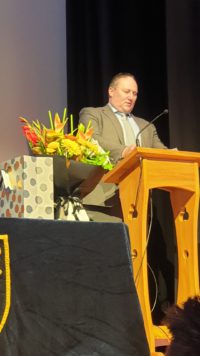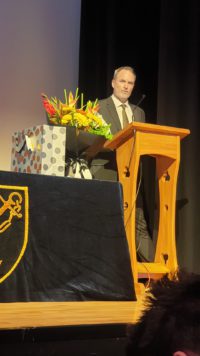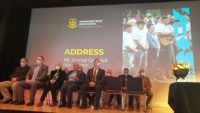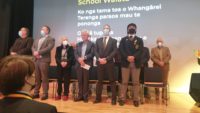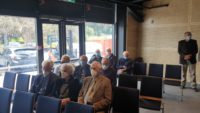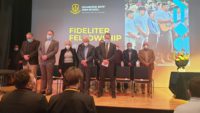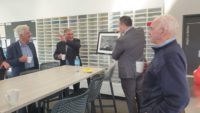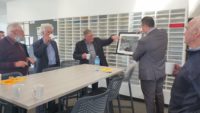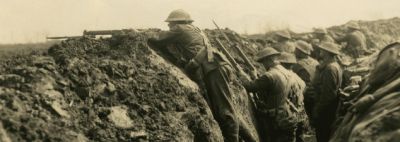John Bell
John has had a distinguished academic, public service and business career. He was at WBHS in 1953 when the Intermediate School Forms 1 and 2 (years 7 & 8) were part of WBHS.
John’s achievements while at Whangarei Boys’ High School include:
- A Deputy Prefect in 1958 and a Prefect in 1959. In most of his years at school, John was placed near the top of his class. In his final year, he was awarded a Studentship to study at Auckland University.
- John played a leading role in the School’s military cadets, serving as regimental Sergeant Major.
- John assisted the music master with the annual combined school concert and accompanied the morning assembly singing on the piano.
- John also assisted the sports master responsible for Life-Saving Training – Cliff Brunker. During his time at the school, John was awarded a Silver Medallion and an Instructor’s certificate by the Royal Lifesaving Society.
- John acted in public performances of plays produced by the English Master – Erich Blow, including an Agatha Christie murder mystery that drew capacity audiences on two nights in the old school hall.
- In the winter, John played in one of the School’s soccer teams.
After completing his Masters’ degree at Auckland University (in chemistry), John was appointed to a Teaching Fellowship at Sydney University and commenced studies for a PhD. Part of his research was a pioneering low-temperature neutron diffraction study of a molecule known as imidazole. This molecule plays an important role in many biological processes. He also undertook research on amino acid interactions with copper.
Following completion of his PhD, he spent three years as a Post Doctoral Fellow at the University of California, Los Angeles where he worked on determining the structures of proteins. He was then awarded a Research Fellowship at the Australian National University. His research over the years resulted in a number of publications in the scientific literature.
In 1974 he was recruited into the Australian Public Service in the Environment Department, where he played a key role in the development of environmental impact statement legislation and administered this legislation in respect of two controversial projects – mineral sand mining on Fraser Island and the Ranger Uranium mine. His work led to the closing of sand mining, and Australia signing the Nuclear Non-Proliferation Treaty as part of the Ranger mine approval.
In 1977 he was appointed Counsellor (Science and Environment) in the Australian
Permanent Delegation to the OECD, Paris. He represented Australia on major OECD committees and played a significant role in establishing the OECD’s hazardous chemicals work.
In 1980 John returned to a senior position in the Australian Government’s Science
Department. He led the Technology Development Division and was successful in
establishing a tax incentive for venture capital before returning to the OECD in 1984 as Head of the Science and Technology Policy Division. In this role, he advised governments of the member countries on policies to promote science, technology and innovation.
John’s return to Australia at the end of 1988 led to his appointment as Deputy Secretary and Chief Science Adviser in the Industry Department. He was appointed a member of the Australian Industry Research & Development Board and the Australian Research Council. He chaired the Australian Commonwealth Science Coordination Committee.
He made a major contribution to the establishment of the Australian Cooperative Research Centres Program including chairing the committee managing the program. He served two periods as acting Director of Australian Government research organisations: the Australian Nuclear Science and Technology Organisation and the Australian Institute of Marine Science.
In 2001, John joined one of Australia’s leading consulting companies – now ACIL Allen Consulting. He has played a leading role in teams undertaking major projects for numerous government (federal and state) and private sector clients, including the Australian Bureau of Statistics, the New Zealand Ministry of Business and Innovation and Employment, CSIRO and the University of Sydney. Projects have included:
- A major strategic review of the Bureau of Statistics
- A study of factors influencing the availability of science, medical and engineering skills in Australia
- Implementation of disability standards in communications, education and transport
- Evaluation of energy efficiency programs
- Assessment of measures to control asbestos
As an elected Fellow of the Australian Academy of Technology and Engineering, John has represented the Academy in the work of the Australia Council of Learned Academies (ACOLA). John chaired two ACOLA expert working parties reporting to the Chief Scientist on the contribution of innovation to productivity growth, and on research collaboration.
John is also a Fellow of the Royal Australian Chemical Institute, a Companion of Engineers Australia and a Member of the Australian Institute of Company Directors. He is currently a non-executive Director of the Australian Genome Research Facility Ltd and has previously been a director of other companies.
In 2003 John was awarded a Centenary of Federation Medal for his strategic contribution to research and development in Australia.
